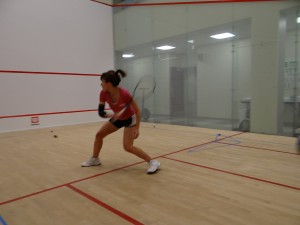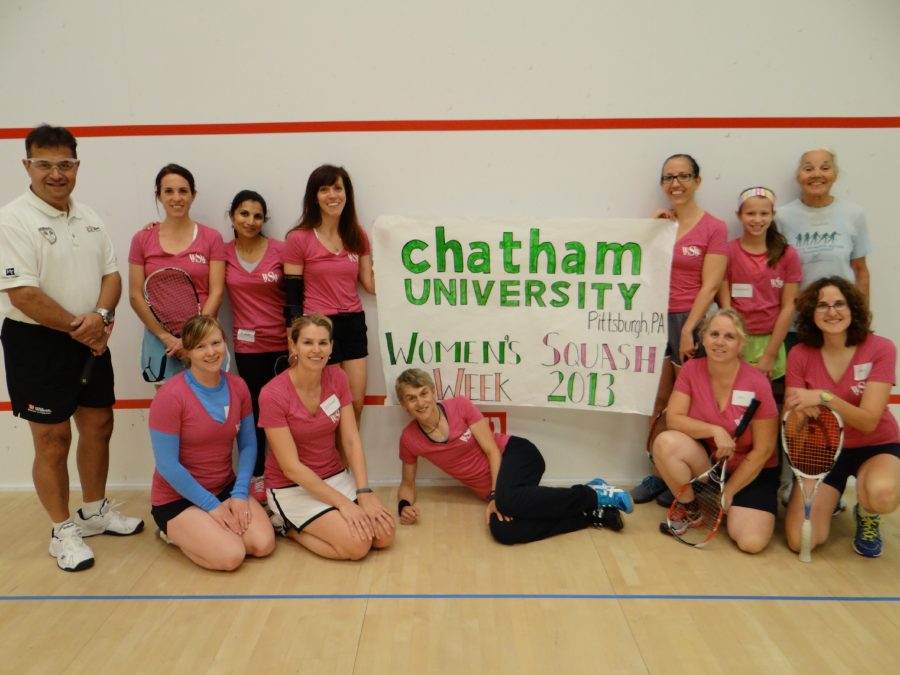A brief history of the game of squash indicates that it is a sport that has been practiced for centuries in various forms. Squash rackets originated from the ancient game of tennis which was played in the twelfth century in the narrow streets of French villages. The game became popular in England, around the middle of the 19th century at the Harrow Boarding School of England. In 1864 the first four squash courts were constructed at the school.
For quite a long time, squash had been labeled “an old boy, Ivy League schools, and private clubs sport” inaccessible to the common athlete. However, for the past forty years or so, that has not been true. According to recent statistics published by the World Squash Federation, squash is played in some 185 countries on nearly 50,000 courts.
Chatham’s squash complex was built about 12 years ago. Coach Costa who teaches squash at Chatham as a regular sports activity explained he had the opportunity to provide some advice during the building of their structure. Chatham University is the only higher educational institution in the area to have squash courts that are built to international standard.

Amy Gilleazeau who attended Chatham College was ranked in the top 114 college players in the USA during the 2009-2010 seasons and placed 3rd in the Caribbean Squash championship in 2010.
Both Coach Costa and Dr. Sean McGreevey (the Assistant Dean of Students and an avid scholar of the game) emphasized that squash is a more complex and strategic sport than it appears. It is sophisticated and at the same time technical; it is considered a great body and mind exercise.
Squash strengthens the core and glutes of the athlete. Playing a serious game of squash can burn an average of 850 kcal/hour. Forbes magazine in 2003 classified squash at the top of the ten healthiest sports to practice.
In providing an analysis of the game, Coach Costa said that it is a game of deception. The speed of the ball movement and its size forces the player to maintain constant focus and have a keen awareness of the opponent and ball positions.
Coach Costa said, “Squash is known as the chess of Racket sport, it is a game of geometry and angle and this cannot be mastered by anyone. Squash is life and the rest is mere detail.”
Furthermore, it was emphasized that squash is weather proof, being practiced indoors; it is suitable for all ages; The health benefits are many. To name a few, it builds endurance and leg power, promotes coordination, boosts flexibility, improves concentration, and increased strength and stamina, those advantages may explain the growing popularity of the sport.
Dr. McGreevey provided a practitioners approach to the game. He explains that squash, while being excellent exercise for general fitness, is also a mental sport. One needs to maintain their inner aggression in order to have the optimum results. It also helps to deal with frustration.
However, one has to be aware that in this game, hitting harder it is not necessarily better. The player needs to adjust his/her game to the opponent. Dr. McGreevey also indicated that to be beneficial a player should practice at least three one-hour sessions a week.
He also gave a little insight in dealing with the equipment–particularly the ball, which needs to be warm in order to respond to the player hit. Additionally, the density of the ball differs according the altitude. For the players who passed the beginner stage, there is a Pennsylvania league, the Box league, which is an online matching of players that works on a six week rotation.
Squash seems to present all the advantages of a complete and thorough workout. For those who want to try it, Coach Costa would like to mention that up to date and standardized equipment is available to borrow for the classes. Squash sessions are held on Monday to Thursday from 6:30 p.m. to 7:45 p.m. There is also a faculty clinic twice a week for 10 weeks between 4 p.m. and 6 p.m. The program is oriented toward beginners.


